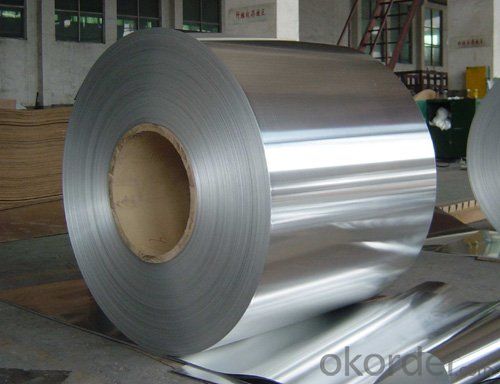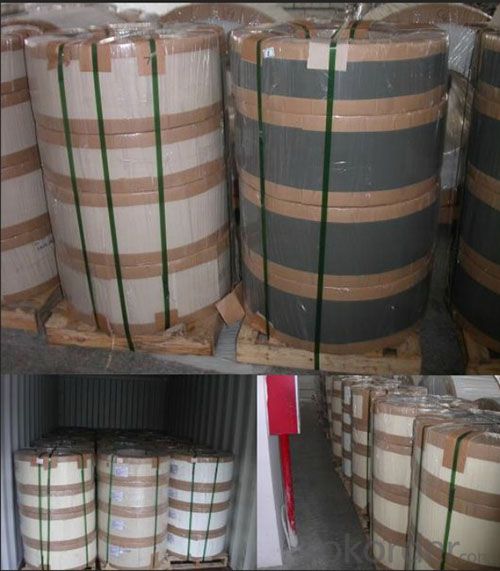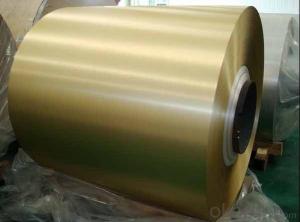Coated Aluminium Coil/Roll For Aluminium Garage Door
- Loading Port:
- Shanghai
- Payment Terms:
- TT OR LC
- Min Order Qty:
- 2 m.t.
- Supply Capability:
- 50000 m.t./month
OKorder Service Pledge
OKorder Financial Service
You Might Also Like
Item specifice
Coated Aluminium Coil/Roll For Aluminium Garage Door
Description
Alloy | 1060, 1100, 3003, 8011, etc. |
Temper | H16, H18, H24, H26, H28 |
Thickness | From 0.05mm to 3.0mm |
Width | Standard width:1240mm |
Special width:1300mm, 1520mm, 1570mm, 1595mm | |
Diameter | Standard dia:1200mm |
Interior dia:150mm,405mm,505mm | |
Weight | 2.5 T/coil,3.0 T/coil |
Coating | PE, PVDF, ACRYLIC |
Surface | Embossed, mill finish, coated |
Color | AS to code RAL |
Gloss | 10-90%(EN ISO-2813:1994) |
Coating Thickness | PE: more than 18 micron |
PVDF: more than 25 micron | |
Coating Hardness(pencil resistance) | More than 2h |
Coating adhesion | 5J (EN ISO-2409:1994) |
Impact Resistance | No peeling or cracking(50 kg/cm,ASTMD-2794:1993) |
Flexibility(T-bend) | 2T |
MEK resistance | More than 100 |
Advantage | 1.High temperature resistant 2.Weathering resistant 3.Scrubbing resistant 5.Acid or alkali proof 6. Fireproof 7.Light weight material is easy to construct and install |
Out package | Wooden splint with export standard |
Application | ACP, wall cladding, facades, roofs and canopies, ceilings, signboards, blind window, display platforms, electrical panels, etc |


Manufacturing
Decoiler → Accumulator →Tension Leveler →Acid & Alkali Cleaner → Rinse →Conversion Treatment → Priming coater →Infrared Curing Oven →Main coater →Floatation Curing Oven →Strippable Film Applicator → Exit Accumulator → Recoiler
FAQ
--Q: Do you provide free samples?
--A: Yes, free samples will be sent to you on freight at destination.
--Q: Can I get your latest products catalogue?
--A: Yes, it will be sent to you in no time.
--Q: What is the MOQ?
--A: 2 tons
--Q: What are your payment terms?
--A: We accept L/C, T/T.
--Q: What kinds of alloy can you supply?
--A: 1000 series: 1050, 1060, 1070, 1100, 1145, 1200
3000 series: 3003, 3004, 3105, 3104
5000 series: 5052, 5083, 5754, 5182
6000 series: 6061, 6063, 6062, 6063
8000 series: 8011, 8021
--Q: What kinds of temper can you supply?
--A: O-H112: O,H12,H14,H16,H18,H22,H24,H26,H,32,H34,H111,H112
T3, T4, T6
- Q:What is the maximum temperature resistance of aluminum coils?
- Various factors, including alloy composition, purity, and specific application, determine the maximum temperature resistance of aluminum coils. Generally, aluminum has a low melting point of approximately 660 degrees Celsius (1220 degrees Fahrenheit). As a result, the temperature resistance of aluminum coils typically falls between 200 and 400 degrees Celsius (392 to 752 degrees Fahrenheit). Exceeding these temperatures may lead to structural alterations in aluminum, such as softening or deformation, which could affect its performance and integrity. Consequently, it is crucial to consider the specific demands and limitations of the application when determining the maximum temperature resistance of aluminum coils.
- Q:I would like to know because I'm getting a sword with an aluminum sheathe.
- No, it is a very soft metal. However for a sheath it will likely be fine, unless you intend on practicing using the sheath for blocking as some Samurai used it for.
- Q:What are the advantages of using pre-painted aluminum coils?
- There are several advantages of using pre-painted aluminum coils. Firstly, pre-painted aluminum coils come with a durable and long-lasting finish that provides excellent resistance against weathering, corrosion, and UV rays. This makes them ideal for exterior applications, as they maintain their color and appearance over time. Secondly, pre-painted aluminum coils offer a wide range of color options, allowing for greater design flexibility and customization. Whether for architectural, signage, or industrial purposes, there is a vast selection of colors and finishes available to meet specific project requirements. Thirdly, pre-painted aluminum coils are lightweight yet strong, making them easy to handle and install. This reduces labor costs and time during the installation process. Additionally, aluminum is naturally resistant to rust and does not require regular maintenance, resulting in further cost savings. Lastly, pre-painted aluminum coils are environmentally friendly. Aluminum is a highly recyclable material, and the pre-painting process ensures minimal waste and emissions. Using pre-painted aluminum coils not only contributes to sustainable practices but also helps in achieving LEED certifications for green building projects. Overall, the advantages of using pre-painted aluminum coils include durability, customization options, ease of installation, cost-effectiveness, and environmental sustainability.
- Q:How do aluminum coils compare to other metal coils?
- Compared to other metal coils, aluminum coils possess several advantages. To begin with, aluminum, being a lightweight material, facilitates easier handling and transportation. This particular characteristic also contributes to reduced shipping costs. Additionally, aluminum coils exhibit exceptional resistance to corrosion, making them suitable for various environments and applications. Moreover, their high malleability allows for easy bending and shaping without compromising their structural integrity. Furthermore, aluminum coils demonstrate excellent thermal conductivity, ensuring efficient heat transfer in applications such as HVAC systems. Lastly, aluminum is an environmentally friendly choice as it is highly sustainable and recyclable. In conclusion, aluminum coils offer a cost-effective, durable, and versatile alternative to other metal coils.
- Q:How are aluminum coils used in the production of HVAC ductwork?
- Aluminum coils play a significant role in the production of HVAC ductwork. These coils are made from high-quality aluminum material that is lightweight, durable, and corrosion-resistant, making them ideal for use in HVAC systems. The first step in utilizing aluminum coils for HVAC ductwork production is the manufacturing process. The coils are initially rolled into thin sheets, which are then cut into specific widths and lengths to match the size requirements of the ductwork. This flexibility in sizing allows for customized ductwork that fits perfectly in various HVAC systems. Once the aluminum coils are cut into the desired dimensions, they are then formed into the shape of the ductwork. This can be done through a variety of methods, such as bending, folding, or rolling, depending on the design and specifications of the ductwork. One of the key advantages of using aluminum coils in HVAC ductwork production is their excellent thermal conductivity. Aluminum is a highly effective heat conductor, which means that it can efficiently transfer heat or cold air throughout the HVAC system. This property is essential for the proper functioning of the ductwork, as it helps maintain the desired temperature in different areas of a building. Moreover, aluminum coils are known for their resistance to corrosion, which is crucial in HVAC systems. The coils are exposed to various elements, including moisture, which can lead to rust and deterioration in other materials. Aluminum, on the other hand, naturally forms a protective oxide layer that prevents corrosion, ensuring the longevity and reliability of the HVAC ductwork. Furthermore, the lightweight nature of aluminum coils makes them easy to handle and install. This reduces the labor and time required for ductwork installation, resulting in cost savings for both manufacturers and installation teams. Additionally, the lightweight nature of aluminum coils reduces the overall weight of the HVAC system, making it more energy-efficient and reducing the strain on other components. In conclusion, aluminum coils are an essential component in the production of HVAC ductwork. Their lightweight, durable, and corrosion-resistant properties, along with excellent thermal conductivity, make them ideal for efficiently transferring air throughout the HVAC system. Additionally, the flexibility in sizing and ease of installation further contribute to their widespread use in the HVAC industry.
- Q:Are aluminum coils suitable for HVAC ductwork?
- Yes, aluminum coils are suitable for HVAC ductwork. Aluminum coils are preferred for HVAC ductwork due to their lightweight and corrosion-resistant properties. They are highly durable and can withstand extreme temperatures and weather conditions. Additionally, aluminum coils have excellent thermal conductivity, which allows for efficient heat transfer and ensures optimal cooling or heating performance. Moreover, aluminum is a non-toxic material, making it safe for use in HVAC systems. Overall, aluminum coils are an ideal choice for HVAC ductwork, providing long-lasting performance and energy efficiency.
- Q:How are aluminum coils used in the production of furniture and fixtures?
- Furniture and fixture production heavily relies on aluminum coils, which play a vital role in creating lightweight and long-lasting pieces. These coils are typically crafted from top-notch aluminum alloys, known for their exceptional strength-to-weight ratios and resistance to corrosion. One primary application of aluminum coils in furniture production involves constructing frames for chairs, tables, and other seating arrangements. Aluminum's lightweight nature simplifies handling and transportation, while still providing the necessary structural integrity. The coils can be easily molded, welded, and assembled into various frame designs, offering flexibility in creating different furniture styles. Furthermore, aluminum coils find frequent use in manufacturing fixtures like cabinets, shelves, and display racks. These coils can be cut, shaped, and bent to create customized components that perfectly suit specific design requirements. Aluminum's corrosion resistance ensures that these fixtures can endure exposure to moisture, making them suitable for both indoor and outdoor settings. Moreover, the utilization of aluminum coils in furniture and fixture manufacturing offers advantages that go beyond their physical properties. Aluminum is a highly recyclable material, making it an environmentally friendly choice. Its durability and low maintenance requirements also contribute to cost-effectiveness, reducing long-term expenses for manufacturers and consumers alike. To summarize, aluminum coils are indispensable in furniture and fixture production due to their lightweight, durable, and corrosion-resistant characteristics. Their versatility enables the creation of various designs, while their recyclability and cost-effectiveness make them a preferred choice in the industry.
- Q:Can aluminum coils be used for heat transfer applications?
- Yes, aluminum coils can be used for heat transfer applications. Aluminum is known for its excellent thermal conductivity, which means it is highly effective in transferring heat. Aluminum coils are commonly used in various heat transfer applications such as air conditioning systems, refrigeration units, and heat exchangers. The lightweight and corrosion-resistant properties of aluminum also make it a popular choice for these applications. Additionally, aluminum coils can be easily shaped and formed, allowing for efficient heat transfer in complex systems.
- Q:Are aluminum coils suitable for beverage can manufacturing?
- Aluminum coils are indeed appropriate for the production of beverage cans. Aluminum is the favored material for this purpose because of its numerous beneficial characteristics. To begin with, aluminum is lightweight, enabling easy transportation and handling. This is especially crucial in the beverage industry, where a substantial number of cans are manufactured and distributed. Furthermore, aluminum possesses high malleability, allowing it to be shaped into the desired form without compromising its structural integrity. This quality makes it perfect for the manufacturing of cans, as it can be effortlessly molded into the cylindrical shape required and withstand the pressure exerted by carbonated beverages. Moreover, aluminum is non-toxic, ensuring that it does not contaminate the beverages stored within the cans. It also acts as a protective barrier against light, oxygen, and moisture, effectively preserving the flavor and quality of the beverages. Additionally, aluminum is recyclable, thus making it an environmentally friendly option for can production. The recycling process for aluminum consumes significantly less energy than the production of new aluminum, rendering it a sustainable material choice. In summary, the appropriateness of aluminum coils for beverage can manufacturing is evident due to their lightweight nature, malleability, non-toxicity, preservation properties, and recyclability.
- Q:Are there any environmental benefits to using aluminum coils?
- Using aluminum coils offers several environmental benefits. First and foremost, aluminum is a highly sustainable material that can be recycled without losing its original properties. This reduces the need for mining and extracting new raw materials, thereby decreasing the environmental impact of these processes. Additionally, recycling aluminum requires only a fraction of the energy needed to produce primary aluminum, resulting in substantial energy savings and reduced greenhouse gas emissions. In addition, aluminum coils have a longer lifespan compared to other commonly used materials like copper or steel. This means that fewer coils need to be manufactured and replaced over time, leading to reduced waste generation and a lower overall environmental impact. Furthermore, aluminum is corrosion-resistant, eliminating the need for potentially harmful treatments or coatings. This reduces the release of hazardous substances into the environment during the manufacturing and use of aluminum coils. Lastly, aluminum's lightweight nature contributes to lower transportation costs and energy consumption during distribution. This results in decreased fuel consumption and associated emissions, ultimately reducing the carbon footprint of using aluminum coils. Taking all these factors into consideration, the use of aluminum coils provides significant environmental benefits, including reduced resource extraction, energy conservation, waste reduction, and lower emissions.
1. Manufacturer Overview |
|
|---|---|
| Location | |
| Year Established | |
| Annual Output Value | |
| Main Markets | |
| Company Certifications | |
2. Manufacturer Certificates |
|
|---|---|
| a) Certification Name | |
| Range | |
| Reference | |
| Validity Period | |
3. Manufacturer Capability |
|
|---|---|
| a)Trade Capacity | |
| Nearest Port | |
| Export Percentage | |
| No.of Employees in Trade Department | |
| Language Spoken: | |
| b)Factory Information | |
| Factory Size: | |
| No. of Production Lines | |
| Contract Manufacturing | |
| Product Price Range | |
Send your message to us
Coated Aluminium Coil/Roll For Aluminium Garage Door
- Loading Port:
- Shanghai
- Payment Terms:
- TT OR LC
- Min Order Qty:
- 2 m.t.
- Supply Capability:
- 50000 m.t./month
OKorder Service Pledge
OKorder Financial Service
Similar products
New products
Hot products
Related keywords





























